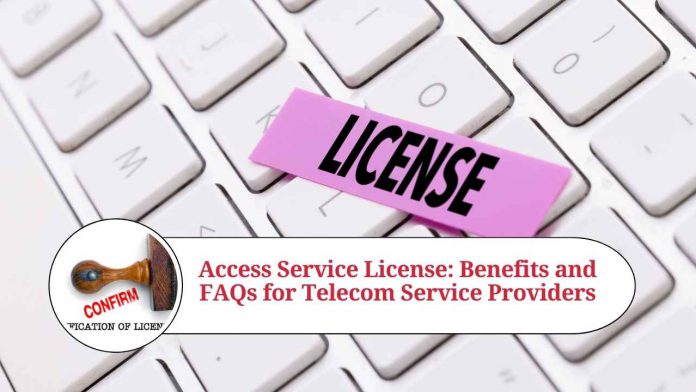Access Service License: Everything You Need to Know
Access Service License (ASL) is a license issued by the Department of Telecommunications (DoT) in India to companies that provide telecom infrastructure services such as leased lines, dark fiber, and tower sharing services. In this blog, we’ll cover everything you need to know about Access Service License, including what it is, how to obtain it, and its benefits.
What is Access Service License (ASL)?
Access Service License (ASL) is a license issued by the Department of Telecommunications (DoT) in India to companies that provide telecom infrastructure services such as leased lines, dark fiber, and tower sharing services. ASL allows telecom service providers to operate as an infrastructure provider and offer services to other telecom service providers.
Types of Access Service License
There are two types of Access Service License that a company can obtain:
- National Long Distance (NLD) License: This license allows a company to provide long-distance telecom services across the country.
- International Long Distance (ILD) License: This license allows a company to provide long-distance telecom services between India and other countries.
How to obtain Access Service License?
To obtain an Access Service License, the following steps need to be followed:
- Company Registration: The first step is to register a company in India. The company must be registered under the Companies Act, 2013.
- Apply for Unified License: The company needs to apply for a Unified License (UL) from the DoT. UL allows a company to provide a range of telecom services, including access services.
- Meet Eligibility Criteria: The company must meet the eligibility criteria set by the DoT to obtain an Access Service License.
- Pay License Fees: The company must pay the license fees as specified by the DoT.
Benefits of Access Service License
- Increased Revenue: Access Service License allows a company to provide telecom infrastructure services to other telecom service providers, which can lead to increased revenue.
- Market Expansion: ASL allows a company to expand its market and reach a wider customer base.
- Infrastructure Sharing: ASL allows a company to share its telecom infrastructure with other service providers, which can lead to cost savings.
- Better Service Quality: ASL can lead to better service quality as telecom service providers can use the infrastructure provided by ASL license holders to offer better services to their customers.
Access Service License (ASL) is an important license for telecom service providers as it allows them to operate as an infrastructure provider and offer services to other telecom service providers. With an ASL, a company can offer a range of telecom infrastructure services, including leased lines, dark fiber, and tower sharing services. Telecom service providers can benefit from ASL in the following ways:
- Cost Savings: ASL allows telecom service providers to share infrastructure with other service providers, which can lead to cost savings. For example, instead of building their own tower, a service provider can share a tower with another service provider and save on infrastructure costs.
- Better Service Quality: ASL can lead to better service quality as telecom service providers can use the infrastructure provided by ASL license holders to offer better services to their customers. For example, a service provider can use high-quality fiber optic cables provided by an ASL holder to offer faster internet speeds to their customers.
- Market Expansion: ASL allows a company to expand its market and reach a wider customer base. With access to telecom infrastructure services provided by an ASL holder, telecom service providers can offer their services in new areas and expand their customer base.
- Regulatory Compliance: Obtaining an ASL ensures that telecom service providers are in compliance with the regulations set by the Department of Telecommunications (DoT). ASL holders must meet the eligibility criteria set by the DoT, which includes financial and technical requirements.
Conclusion
Access Service License (ASL) is an important license for telecom service providers in India. ASL allows telecom service providers to operate as an infrastructure provider and offer services to other telecom service providers. Telecom service providers can benefit from ASL by achieving cost savings, better service quality, market expansion, and regulatory compliance. Therefore, obtaining an ASL can be a strategic move for telecom service providers looking to grow their business in India.
Read more useful content:
Frequently Asked Questions (FAQs)
- What is an Access Service License (ASL)?
An Access Service License (ASL) is a license issued by the Department of Telecommunications (DoT) in India to companies that provide telecom infrastructure services such as leased lines, dark fiber, and tower sharing services.
- What are the benefits of having an ASL?
The benefits of having an ASL include increased revenue, market expansion, infrastructure sharing, and better service quality.
- What is the eligibility criteria for obtaining an ASL?
To obtain an ASL, a company must meet the eligibility criteria set by the DoT, which includes financial and technical requirements.
- Can a company obtain both National Long Distance (NLD) and International Long Distance (ILD) licenses?
Yes, a company can obtain both NLD and ILD licenses.
- How long does it take to obtain an ASL?
The time it takes to obtain an ASL can vary depending on the completeness of the application and other factors. Generally, it can take several months to obtain an ASL.
- Can an ASL holder provide other telecom services besides access services?
Yes, an ASL holder can provide other telecom services besides access services if they have obtained the necessary licenses.
- What are the license fees for obtaining an ASL?
The license fees for obtaining an ASL vary depending on the type of license and the service area.
- Can an ASL holder share its infrastructure with non-telecom companies?
No, an ASL holder can only share its infrastructure with other licensed telecom service providers.
- Can an ASL holder operate in all parts of India?
Yes, an ASL holder can operate in all parts of India, subject to compliance with the relevant regulations and guidelines.
- What is the validity period of an ASL?
The validity period of an ASL is 20 years, subject to renewal.




















